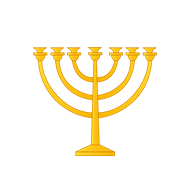John Wycliffe
Among the forerunners of the Reformation, John Wycliffe deserves especially to be mentioned. He was born in the year 1324. He became a member of the University of Oxford, where he afterward was employed as teacher. In the last years of his life he became pastor of the church in Lutterworth. He was renowned for his learning and diligent study of the Scriptures. He wrote a great deal against the shameful conduct of the monks, and without mercy he pointed out their intrigues and sloth. By this he soon incurred the displeasure of the pope. But Wycliffe had rendered valuable services to the state, and the civil power protected him even until his death.
Wycliffe attacked the worship of saints and images very severely. He organized a society of God fearing men, who preached the gospel to the people all through the Country. He also translated the Bible into the English language so that all could have access to the Scriptures in their mother tongue. This is the first translation of the Scriptures into the English language, and is a work of great merit.
Wycliffe died in the year 1384 in the church, while he was conducting the services. It was not until after his death that his enemies succeeded in obtaining revenge. In obedience to the order of the council of Constance, the bones of this supposed heretic were dug up, and in the year 1428 they were publicly burned, together with his books.
Before his death Wycliffe made the following beautiful confession:
“God is my witness that above all other things I have sought the honor of God, to reverence His word, and obey His law. But if, with this intention, some impure desire for worldly renown or low gain or wicked revenge has crept in unknown to me, then I sincerely repent of it, and by the grace of God I will be on my guard against it.”
Wycliffe left a great number of disciples, and their conduct was a beautiful seal of his divine calling. Even his enemies had to testify of them as follows:
“The followers of Wycliffe are men with sober and modest conduct. They avoid all finery in dress, and take but little part in worldly affairs. They earn their living exclusively by the work of their hands, and cherish the greatest contempt for riches. They are perfectly contented if they have only the most necessary things of life. They are chaste and temperate, and are never found in the inns or at the public pleasures. Yet they are always busy; they either teach themselves or they teach others. They are devotional and short in their prayers, and put great stress on charity in their sermons.”
Marching on to the promised prize
We ever look upward with longing eyes;
The Lord is preparing our mansion on high,
And will bring our reward in the sweet by and by.
Yes, crowns of glory we soon shall wear,
And palms of victory we soon shall bear,
Robes of righteousness pure and white,
Walking the streets of refulgent light.
When the day of the Lord shall come,
And the Church of the living God at home,
We’ll make the celestial city ring
With the sound of glory we shall sing,
Thou hast redeemed us dear Lamb of God;
Cleansed from all sin by thy precious blood;
All sorrow and sickness and death passed away,
When a nation was born to the Lord in a day.
John Huss
The Bohemian reformer, John Huss, was born 1373. His father was a poor field laborer. He was educated at the University of Prague, where he began to lecture publicly in 1398. As a confessor to the queen, he had access to the court. By his great eloquence and Christian kindness toward all he gained the favor of the people, even among the poorest.
Of his conversion Huss says:
“Once I also was wrapped in the sweet slumber of carnal security until it pleased the Lord Jesus to deliver my wretched soul from my sensual desires, as once He saved Lot out of the fire of Sodom, and to bring me into the abode of suffering ignominy and contempt. Then for the first time I became poor and broken hearted, and as I with fear and trembling studied the word of God, I began to admire the treasures of wisdom therein. Then for the first time I understood how greatly Satan had blinded the eyes even of the wise and great of this world. My heart now was thrilled with a new, powerful, saving fire which still works in prayer to God and the crucified Jesus.”
Afterward, when he read the writings of Wycliffe and became acquainted with his doctrine, his eyes were opened to the corruption of the Roman Church. He preached against the prevailing corruption but especially against selling indulgences, when this was introduced in Prague. He was now more and more involved in controversy with the papal church, and in the year 1413 he was excommunicated.
Huss was, however, so highly esteemed by the government and the people of Bohemia that the papal party was unable to injure him. A general council was therefore convened in Constance. Having received promise of protection and liberty to return, Huss went to Constance; but it was not long before he was seized and thrown into prison. The faithless emperor, who had given him a letter of safe conduct, was informed that it was not necessary to keep a promise given to a heretic, and he cared nothing for the complaints made by the friends of Huss.
Huss suffered greatly in his miserable prison. He arrived at Constance, Nov. 3, 1414, and was thrown into prison November 28. On account of the earnest appeals from the Bohemians, a public hearing was finally appointed to be held January 5th of the next year.
The council before which Huss had to appear was composed of the highest dignitaries of the church and the kingdom. It consisted of thirty-four cardinals, twenty archbishops, one hundred and sixty bishops, two hundred and fifty priests, four electors, twenty dukes, and eighty counts.
As soon as Huss opened his mouth to answer the many false accusations which were brought against him, the whole assembly cried out with such vehemence and fell upon him with such rage that one would sooner think they were a multitude of wild animals than an assembly of honorable men. June 8 and 9 there was a hearing where Huss finally had an opportunity to defend himself.
From prison he wrote to his Bohemian brethren:
“I exhort you to be faithful and hold fast the truth of the divine word in the manner in which I have preached it unto you. Yet if any one in public speech or private conversation should have heard, or in any writing should have read, anything which is contrary to the divine truth, then I pray that you will not act accordingly but ask God to forgive me.”
He then exhorted all in words most tender to remember their duties, asked them to pray for their enemies, and comforted them with the fact that he had not yet been condemned to death, and he believed that the Lord even until the end would keep him from renouncing the truth. July 6, the sentence of death was read before him, and the same day he was executed.
At the place of execution he was not permitted to speak, but then he prayed to God with such earnestness that some of those who were present said aloud: “What this man may have done heretofore we know not, but we do now hear that he offers up most excellent prayers to God.” The elector now ordered the executioners immediately to begin the bloody work while Huss prayed aloud: “Lord Jesus, I humbly suffer this terrible death for Thy sake. I pray Thee to forgive all my enemies.”
When he had ascended the pile of wood, he once more took leave of his friends and one more thanked his jailers. Then the executioners tied him to a stake with five wet ropes above the feet, under the knees, above the knees around the waist, and around his arms, and with a rusty chain around his waist. When he saw the chain he smiled and said to the executioners: “My Lord Jesus Christ, our Redeemer and Saviour, has also been tied down with a heavy chain; therefore will I, a poor, sinful man, not be ashamed to bear this chain for His name’s sake.”
When the executioners kindled the fire, Huss sang with a loud voice once: “Christ, Thou living Son of God, have mercy upon me,” And again: “Christ, Thou living Son of God, have mercy upon me,” When he began to sing the third time, the wind threw the flame into his face so that he could not sing, but he prayed silently by himself, and moved his head as long as one could pray the Lord’s prayer three times, whereupon he fell asleep about 11 p. m. July 6, 1415.ê


Leave A Comment